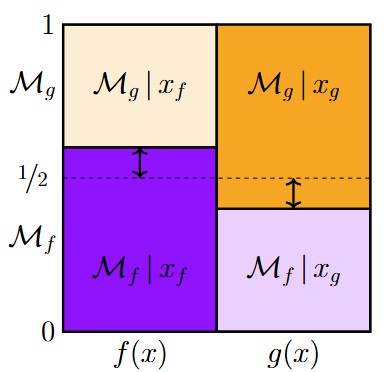The promised post on Einstein will follow next week.
More and more psychologists are registering their hypotheses, predictions, and analysis plans prior to data collection. Will such preregistration be the death knell for creativity and serendipity? Gilles Dutilh, Alexandra Sarafoglou, and I recently wrote an article for Perspectives on Psychological Science that provides a historical perspective on this question. In the article, we describe the origin and development of “the empirical cycle”, that is, the modern perspective on how scientists can learn from data. In the course of our historical investigations, we came across several interesting anecdotes that lack of space prevented us from including. But we can include them in this series of blog posts. Here is the first story, courtesy of Cornelis Menke.
Baron Justus von Liebig vs. Lord Francis Bacon
Francis Bacon is often heralded as the scientific Moses that guided academia out of the dark ages of ignorance and prejudice. As discussed in the article, this idea is probably false. For a counterargument one can do no better than read the 1863 violent take-down by Baron Justus von Liebig, a famous German chemist. In the article we mention von Liebig’s final conclusion about Francis Bacon:
“When a boy, he studied jugglery; and his cleverest trick of all, that of deceiving the world, was quite successful. Nature, that had endowed him so richly with her best gifts, had denied him all sense for Truth.” (von Liebig, 1863b, p. 261)
This is pretty harsh, but not as harsh as some of the other fragments in von Liebig’s piece. Based on the following paragraph, the current guardians of “tone” in scientific discussions (sometimes called “tone police”) would make Baron Justus public enemy number one:
“Whoever studies his ‘Novum Organum,’ or any other of his works, diligently and in good faith, and, with patience and perseverance, follows up a single thought of his through all its turnings, and into all its corners, will find that it resembles, in its origin, a merry spring bursting forth out of the ground. It gives us reason to hope that we shall be led by it, through green and flowery meadows, to cool shady woods, to a brook with mills beside it, and, at last, to a stream bearing ships upon its waters; but, instead of this, the wanderer is brought into a desert, where there is no life, and where the rivulet vanishes amid the barren sand. At first, we take this for a chance occurrence, and think that, in a second or third attempt, we shall be led in other directions more satisfactory; but at last the conviction forces itself upon us, that the whole was but a painted decoration. Eventually we discover the intention, and are ashamed of ourselves for having been deluded by so coarse a deception.” (von Liebig, 1863a, p. 242)
Von Liebig’s poetic assessment can be applied to other frameworks that are misleading yet highly influential. For instance, some people might feel it is apt to replace “Novum Organum” with works such as “Statistical Methods for Research Workers” or with “Frequentist Probability and Frequentist Statistics”.1 The main problem with this analogy, however, is that the frequentist framework, in its origin, resembles a smelly tar pit rather than a merry spring. But this is the topic of another day. 🙂
Like this post?
Subscribe to the JASP newsletter to receive regular updates about JASP including the latest Bayesian Spectacles blog posts! You can unsubscribe at any time.
Footnotes
1 In my opinion this is going too far, but only because the frequentists succeeded in misleading not only their readership, but also themselves. I certainly would not want to argue that there was an explicit attempt at deception, the way von Liebig argues is the case with Francis Bacon.
References
Fisher, R. A. (1925). Statistical methods for research workers. Edinburgh: Oliver and Boyd.
Neyman, J. (1977). Frequentist probability and frequentist statistics. Synthese, 36, 97-131.
von Liebig, J. (1863a). Lord Bacon as natural philosopher (Part I). Macmillan’s Magazine, 8, 237-249.
von Liebig, J. (1863b). Lord Bacon as natural philosopher (Part II). Macmillan’s Magazine, 8, 257-267.
Wagenmakers, E.-J., Dutilh, G., & Sarafoglou, A. (in press). The creativity-verification cycle in psychological science: New methods to combat old idols. Perspectives on Psychological Science. Preprint at https://psyarxiv.com/37ntp.
About The Author

Eric-Jan Wagenmakers
Eric-Jan (EJ) Wagenmakers is professor at the Psychological Methods Group at the University of Amsterdam.



